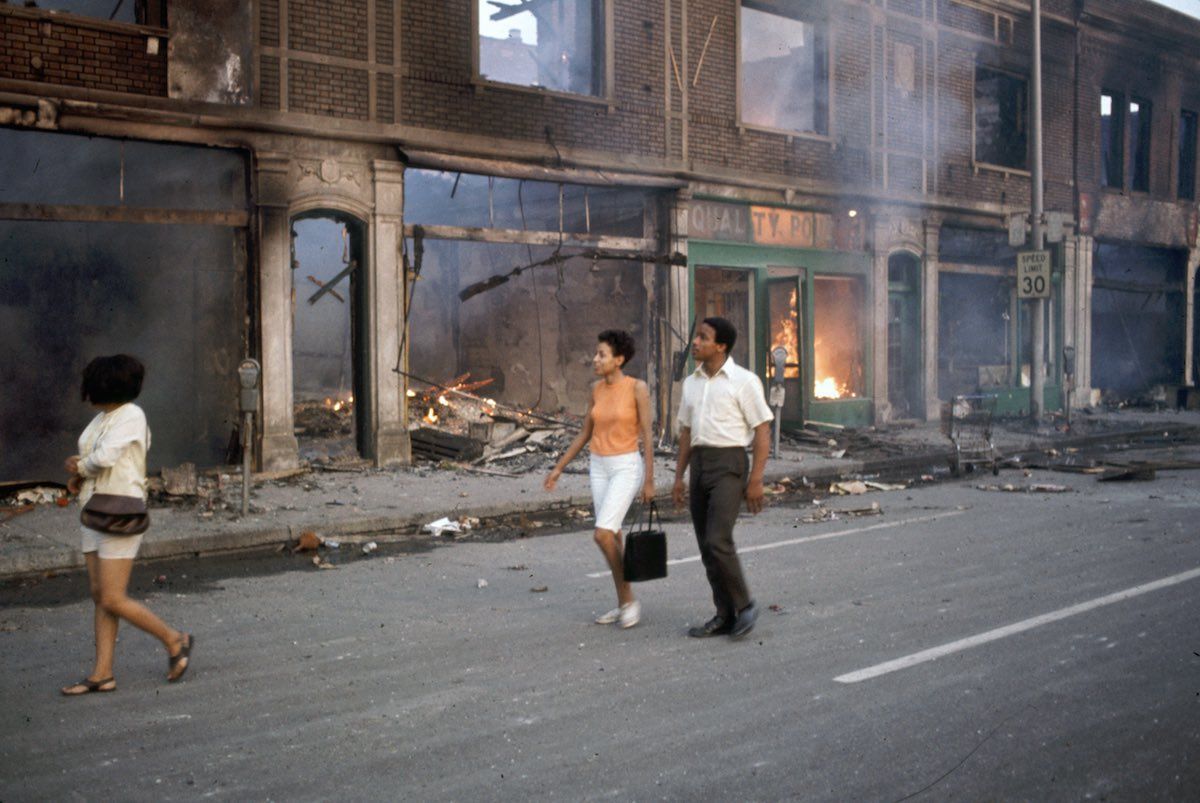
There is an eerie link between Trump’s Muslim ban and the 1967 riot/rebellion
Whether you choose to call it a rebellion or a riot, history is pretty clear that such tumultuous events do not occur in a vacuum. In other words, folks don’t just wake up one fine morning and decide what a wonderful day for a riot.
Without a doubt there are more than a few reasons to question the effectiveness of such events, particularly since the end result is most often widespread destruction of property limited to the confines of the aggrieved community. And in 1967-era Detroit, where a boiling rage and anger against persistent and perpetual racial injustice had been simmering for close to several decades, it didn’t take much for that anger to catch fire and spill over into an all-consuming flame that left behind devastated communities in its wake. Charred skeletons that haunted the city’s landscape for even more decades to follow.
The point being that anger always has a cause and a source, it is not just a stand-alone effect. But 50 years later, the historical significance of that anger is still being debated. Was it a riot? Or was it a rebellion? Was it a righteous protest against an unjust society? Listen to what Dr. Martin Luther King Jr. said one year prior to the 1967 Detroit riot/rebellion when he said, in an interview with Mike Wallace on NBC’s 60 Minutes:
“I contend that the cry of ‘black power’ is, at bottom, a reaction to the reluctance of white power to make the kind of changes necessary to make justice a reality for the negro. I think that we’ve got to see that a riot is the language of the unheard.”
Or was it a riot, devoid of all racial and or political significance? Was it simply an excuse for an unruly crowd to act up and act out, indulging their worst instincts, and stealing whatever they could get their hands on?
How you answer that question is most likely heavily influenced by your politics, as well as your experiences with law enforcement. If you believe that police officers would never purposefully injure another human being without some form of provocation, that they serve and protect everyone equally, then you are more likely to believe that what happened was a lawless riot, plain and simple. However, if your experiences have taught you that police officers are not always there to help you, and that the color of your skin tends to dictate the quality of justice you receive, then the word ‘rebellion’ is more likely to be the way you view the events of July, 1967.
But whichever definition is more accurate, the more potent question today is what, if anything, has been learned from the riot/rebellion of 1967? And to what degree should active physical protests against perceived injustice play a part in shaping the narrative of history and the direction of our shared future?
When is the time to share a table and discuss, and when is the time to scream?
Just take a look at the protests that occurred over the weekend at the Detroit Metropolitan Airport – and around the country – against the ridiculous and harmful anti-Muslim policies enacted by the newly elected President of the United States, clearly designed to discriminate against our fellow citizens based on their religious beliefs. Muslims out, Christians in. As if Christians were never associated with some of the world’s worst atrocities, including slavery and the Ku Klux Klan. It wasn’t Muslims burning those crosses, or lynching black bodies.
You want modern day? Dylann Roof is not a Muslim, nor was Timothy McVeigh.
Thankfully the weekend protests did not escalate into violence, let alone anything resembling a riot, but certainly the seeds for much more mass unrest on a scale as yet unimagined have been sown by this new administration, and it hasn’t even been a month yet.
Fifty years ago, it was Detroit that caught fire in an era of national social and racial unrest that caught the attention of the entire world. The two presidents directly involved with the crisis that was seizing America by the conscience were President John F. Kennedy, followed by President Lyndon Baines Johnson. The historic leadership of both men was largely defined by how they reacted to this crisis, and the actions they took.
The flames consuming us today have been lit by the President himself.
“Please try to remember that what they believe, as well as what they do and cause you to endure does not testify to your inferiority but to their inhumanity”
― James Baldwin, The Fire Next Time